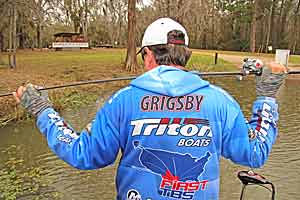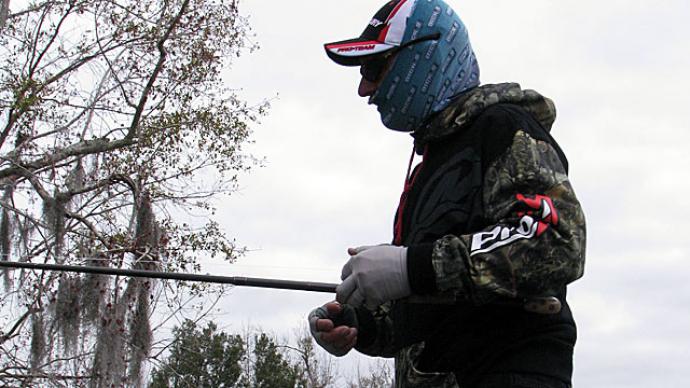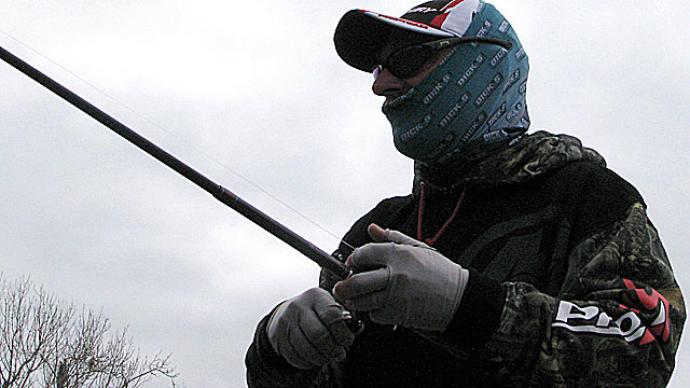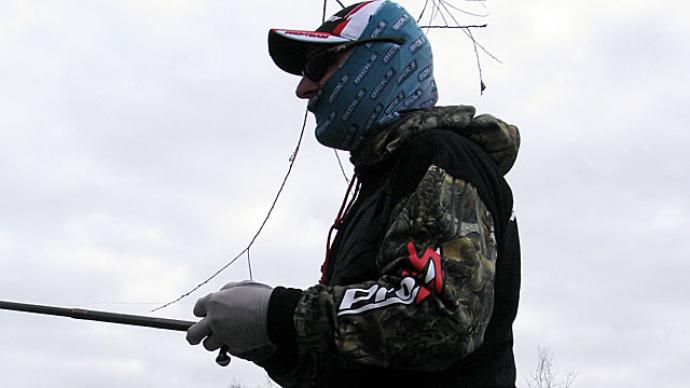
Keri May, co-owner of BassResource.com, spent a day on the water with Shaw Grigsby posing questions that members from our forums submitted for Shaw to answer. Here is part 1 of a nine-part series where Shaw answers every single one of them! In this episode, listen as Shaw explains how to find fish, his first boat, making it as a pro, and more!
Keri: I think it is one of the most interesting questions that quite a few people asked in many different ways, so I will try to cover it with one group. How do you figure out where to go as a new angler in this area? Electronics on how to get there. But what is the strategy on what to do?
Shaw: In any place you go, the one thing you learn after many, many years of fishing. It doesn't matter where you are in the country. A bass is still a bass. They are the same critters in New York, Florida, Japan, Italy, and Spain. I fished Spain. Portugal. They are all the same. It's a bass. And they still react and do the same things.
Finding the mother lode, the fish to win, obviously doesn't happen quickly. But finding fish is something that you should be able to do in any situation. They are doing something the same in all situations. Meaning that we look at it when we came here, the first thing I did was grab a map and spend a lot of time in map study.
I have Google maps on my iPhone. I sat there and looked at it over and over and over. I am finding places where they have dead-end canals. Because all this is, is a canal system. It is a giant canal system. So you go until you find dead-end canals that have cleaner water. Dead-end canals are going to be canals that warm up the quickest.
In this situation, we are coming out of winter. We are looking for water to warm up. Fish to get in a pre-spawn mode. They could get in spawn mode if you found some actual warm water. But we are a little early for that. So we are looking for warmer water. That means you are looking for something that is a dead end. That doesn't have anything running into it.
You have a lot of these canals. If you look at them on the map, many of these canals will break into a lake. So you have a little creek or drainage ditch at the back of it.
All that water on these lakes and in open areas is frigid. And then all the dead-end ones have an opportunity, being protected, to warm up quickest. That is what we did here: look for those dead-end canals, pick you a bunch of them out and then find out how to get there. And you're finding out how to get there, GPS and maps.
Sometimes you think a canal is open getting there, and it's not. You run aground. Sometimes it is supposed to have four or five feet of water, and it's got three inches. Because the water is so low this year, it is just a matter of trial and error and finding your way to it. And then hitting enough of them that you can find which ones have the better fish. Or which ones have a few more fish than the other ones?
What's interesting, is what I found, is I'm in canal systems, and I can pull into this one dead end, get two or three bites and I will go to this one right next to it and get none, go to the one right across from it and get none, and go to another on right there. They all look the same. They all have good depth, everything, and cover. Not get another bite. Then go to another deal and pull in, and no bites, no bass, and then one little shoot will have them.
That's just to me; that's crazy. You would think that instead of just one little deal that is happening, you would have a lot of areas that would have fish. It has not been that way with me. I have been struggling to get bites, and when you get them, it's just like you are going to get them in one area, and that's it.
Keri: Do you use the Internet at all as far as forums?
Shaw: I do a little but not that much. I looked at Louisiana Wild, a magazine that they have here. Had a couple of articles about fishing in this area. Some of you do. A lot of times, you read the stuff, and you are not sure whether you can trust it or not trust it.
Keri: Sure.
Shaw: You would like to think everything is very truthful and honest. Not so on the Internet. We looked at several things. I haven't done well in the muddy water, which I am sitting in right now. But I keep trying it because I know the fish don't care. They will be in either, but my best results have been in clean water. Just finding clean water pockets that are warm enough. Then you tend to get some bites.
Keri: What was your first job?
Shaw: First job. I worked, well, obviously, as a kid mowing yards and raking leaves. I used to load hay for a dollar an hour. When you could turn 16 and get a job, my first real job was at public supermarkets bagging groceries. And then stocked groceries. That was my job for quite a few years through high school. It was fun.
Keri: What lessons have you learned on the water that also apply off the water?
Shaw: A lot of patience. A lot of patience and perseverance. So often, you will be fishing, and things are not happening the way you want them to, and you just have to keep going and persevere. And that is the same thing in life. A lot of times, things don't go the way you want them to. They go the way they do, and you have to make the best of it. And with anything you got to do. You work hard with it out on the water, and you better work hard at life off the water.
Keri: How do you handle the stress of being an elite angler and TV schedule?
Shaw: Handle?
Keri: Yeah. They said stress and pressure being an elite angler and TV.
Shaw: I know I have been able to handle it quite well and don't think much about it. I have felt it and noticed it. Not a whole lot you can do about it. You relax and go fishing and let things happen. You realize early on there is not much you can do about it. You fish hard.
You do everything you can to do as good as possible, and at the end of the day, it's what it is. You fish as hard as you can, and that's it. I don't do anything special.
Keri: What motivates you besides fishing?
Shaw: Just love it. I have a passion for it. I like the bites. And we are all major competitors. We wouldn't be here. Just being a fisherman, you wouldn't be here. You have to be a competitor. And every one of these guys, I don't care if you are playing tidily winks or badminton or a video game. Every one of them wants to beat the next guy. They are extreme competitors. That's what drives them is the competition. So, that is pretty much it.
Keri: In your opinion, what do you think is the most exciting new addition to bass fishing in the industry itself? An electronic lure . . .
Shaw: Structure Scan from Lowrance, HDS units, or StructureScan is phenomenal. It's crazy good. When I first got it, it took me months before I would fish. I would literally idle around and look at everything. I still do. I still catch myself. And now, I've got my transducer mounted. My son was breaking my boat in for me, and he sent me a text. He was kind of worried. He said, "Dad, your Structure Scan quits at about 50 miles an hour." And it was, like, really? I was lit up. And it works at about 60, so it's cool. So, yeah, I'm thrilled with that.
So you can look through things quickly and find laydown logs and rock piles. I found so many sunken boats and just cool stuff on the bottom. It's fun.
Keri: Now the version you have in front, the Lowrance unit in front is a smaller version of the one you have . . .
Shaw: Yeah, it's an eight on the front and a ten on the back. Now, many guys do a ten and ten, do a ten-inches on the front and back. I just like a little more room in the front.
Keri: Larry Sullivan is a friend of ours and a member of the Western Bass Club. He was the one who mentioned the Perry boat.
Shaw: Yeah, Terry Bass.
Keri: Is that Terry Bass? Is that what it is?
Shaw: It's Terry Bass with a "T," is the deal.
Keri: Oh. Okay.
Shaw: Perry is what I ended up with, made out of Perry, Florida.
Keri: Oh. Okay.
Shaw: But Terry boat was the boat. I mean, when I was growing up, oh my gosh.
Keri: So you ended up getting a Perry boat, then?
Shaw: Yeah, P-E-R-R-Y instead of T-E-R-R-Y.
Keri: So you bought one?
Shaw: Yes, I did.
Keri: You did? Are you going to restore it?
Shaw: No, that was a long time ago. That was when I was 15.
Keri: Have you ever thought about getting another one and . . .
Shaw: No.
Keri: No?
Shaw: No, I am real, real happy with my Triton. If nobody sponsored me, I'd go buy a Triton.
Keri: Yeah. I mentioned the question for nostalgic reasons, too. . .
Shaw: No. I have no old boats.
Keri: Yeah.
Shaw: I have no desire to restore or work on . . . I have so much to work on. I do so much stuff that I don't have time to do things like that.
Keri: Sure.
Shaw: It's not a blip on the radar screen.
Keri: Now Larry, he did his homework here. His next question is: After deciding not to follow in your dad's business, how long did it take you to get comfortable knowing that you could survive on a fishing income?
Shaw: I love it. This guy did do his homework.
Keri: Yes, he did.
Shaw: I don't know that I've ever been comfortable. It's one of those businesses where your major sponsor could drop you off tomorrow. You're never confident that everything's cool. It's just not a business. If you're worried about finances, this is not a business to be in. Because it's up and down, and you never know.
So the past couple of years has been challenging, no matter how good you are. I'm sure Kevin, Skeet, and those guys are doing quite well, but you must definitely be way on top. But, most of us, no matter that I've had a 15-year run on television and a 25, 26-year run on professional fishing. All the accolades I've had, we all have taken mega-cuts. When that happens, it's scary. You tighten the belt and go on.
The one thing you have is your fishing ability. Nobody can take that away from you, so that's your base. That's what your livelihood is. You must always work on how good you are, new techniques, and things that come along and ensure you're on the cutting edge, not following behind. Because if you're not performing up to snuff, especially when ESPN bought BASS, they made it everyday stuff pretty much.
Like Roland Martin, they're not letting him back in. He has to work his way to fish Elites here. Roland Martin should not have to work his way to do anything. He should say, "I want to fish," and people should go, "Yeah. He's Roland Martin. Put him in." And he deserves that after being a nine-time Angler of the Year and all the stuff he's done in the industry. It ought to be just opened up. He's an Elite angler. He retired, got out, and now it's like he's got work his way back in.
Well, because of that, there is no comfort level in this sport. Do you know what I mean? You've got to work your way every day, work on your skills, work on your knowledge and stay on the cutting edge of it, or you fall behind.
Keri: Great answer.
Shaw: That's the only thing you've got, your fishing skills as your base. That's what keeps you going.
Keri: I like that. You'll love this question. The same guy on Facebook talked about rigging your new boat with all the high-tech gear. Did you do this yourself, or did someone do it for you? How did you arrange to get it done quickly since you've only had it for a week?
Shaw: I have a great dealer, Miller's Boating Center in Ocala, and the guy Shane there is a tremendous rigger. He's their head mechanic and all that. So, he was set aside. We knew this problem was happening, and he was set aside to work on our boats, mine and Terry Scroggins. Fortunately, Terry's came in early, and he was able to get that done, and then when mine came in, he jumped on it.
I was down there for two half days. That was all I could spend, and I did much of the stuff myself. Like the electric locks, running the electric lines, trolling motor, and all kinds of little things that I did myself, or my son and I did. And all the big stuff, hanging the Power-Poles, running the pumps, mounting the motor, doing all that stuff, jack plate, Shane did.
Fortunately, Darrell from Lowrance, Darrell Rawlings, had set up a complete system for the electronics, so you just ran the cords, and everything was plug and go.
So everything worked out well.
They got it done and, basically, in two-and-a-half days.
And I wasn't around because I was working the sports show, so my son went and spent about three hours on the water running around, breaking it in, checking all the systems, and ensuring everything worked. And, of course, he calls me and says, "you do want me to test the trolling motor." And I said, "Yeah. Just make sure it spins and does that," and he says, "Oh no, you need to put time on it." He wanted to go fishing. And I'm like, "You dog, no, I want that motor run. Don't be going fishing." So he's pretty funny about that.
Keri: How long does it take to break one of these Mercurys in?
Shaw: I do a six-hour break in. They only recommend two hours, but I'm old-school, and I was taught by the best, a Mercury mechanic named that was on tour with us for 15 years or 20 years named Roy Ridgel who died of a heart attack. But he taught me how to break a motor in years and years ago. He spent two hours running it from 3,500 to 2,500 to 3,500, back and forth. Never let it set for more than a minute at any speed. So you're fluctuating the speed for two hours under 3,500, then two hours under 4,500, two hours under 5,500, and then you're going. And you want to put at least four hours into it before you open it up.
And so that was the situation.
My son had put three hours on it when I got here. So I only needed about an hour before I was going to let it rip. And he couldn't handle it, by the way, he did open it up, sorry, dog. He said, "runs well." And I was like, "You sorry son-," and he said, "I didn't do it long," and I said, "I know. I probably would have too."
Anyway, I got hours on it here and got it broken in, and it's doing good. I can't say anything, but it's doing good.



